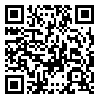BibTeX | RIS | EndNote | Medlars | ProCite | Reference Manager | RefWorks
Send citation to:
URL: http://ijn.iums.ac.ir/article-1-1398-en.html
This study surveys the correlation between the level of mothers' knowledge of physical and psycho-social needs of their chemotherapied children and the way they meet their needs.
In this study 32 mothers visiting Sayed-O-Shohada hospital in Esfahan were randomly selected samples over a period of 50 days. The data collection tool was a questionnaire organized in three parts. Part one was about demographic personal details of the samples. Part two dealt with the way the mothers met their children's physical and psycho-social needs and in part three the level of mothers knowledge of their children's physical and psycho-social needs was evaluated.
The findings of this study are shown in 25 tables in which descriptive and analytical and two statistical methods are used. The findings pertinent to the first hypothesis of research (i.e., the level of mothers' knowledge of the physical needs of their chemotherapied children is correlated to the
way they meet these needs) revealed that the majority of mothers (56.2%) had no appreciable 1ge knowledge of their children's physical needs and a majority of them (68.8%) did not treat these needs properly. Although 42.8% of samples had sufficient understanding, only 31.2% of them met the physical needs correctly. No meaningful relationship was found in the statistical test between in the level of knowledge of the physical needs and the way they are met (x2 =0.33 df= 1). Thus the 10 research hypothesis is refused with 95% assurance: and therefore it is incorrect to say that mothers with higher knowledge meet their children's physical needs because some mothers are aware of their children's needs but they do not treat them properly.
| Rights and permissions | |
 |
This work is licensed under a Creative Commons Attribution-NonCommercial 4.0 International License. |




